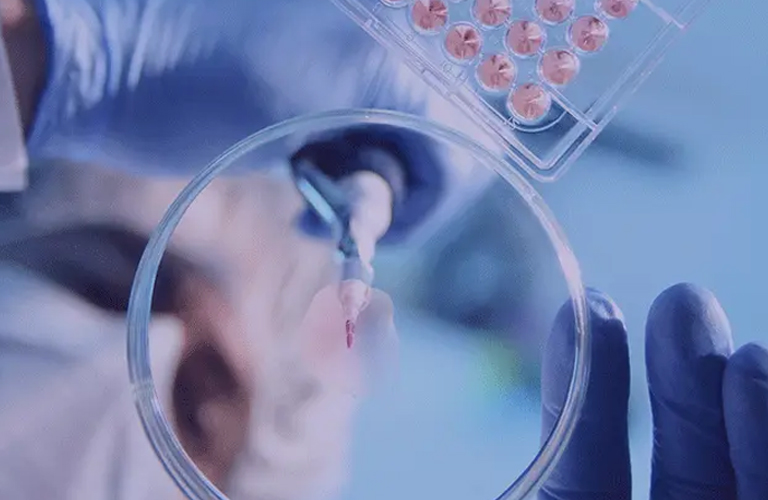Sam Sisodia:The Important Role of Gut Microbiota in AD
Sam Sisodia:Ladies and gentlemen, it is a great honor to be here. I am also an advisor of Green Valley Pharmaceuticals, and a member of the Science Innovation Committee. We are also studying the mechanism of action of the gut-brain axis in Alzheimer's disease.
Today I will briefly introduce the gut microbiota and the mechanism of action of the gut- brain axis, which is a first-of-its-kind mechanism of action.
First, let me briefly describe why GV-971 can take effect. Professor Geng Meiyu and other colleagues have made great efforts to develop the drug and study its mechanism of action. We now want to highlight this new mechanism of action.
Just now, Professor Jeffrey Cummings also briefly introduced that it is a long-acting mechanism of action that acts on the nervous system through the gut microbiota and the gut-brain axis.
Here, I would like to talk about the gut- brain axis, which is actually a two-way signaling pathway between the ENS and the CNS. If the gut microbiota changes, it actually has a lot of effects on the brain. For example, a lot of neurodegenerative diseases are caused by changes in the gut microbiota, such as Parkinson's disease, which is also a neurodegenerative disease, and which happens because there are changes in the gut microbiota, and changes in Lewy bodies. Lewy bodies are expressed as proteins in the CNS, and as you have just seen, this also leads to changes in the nerves, so the CNS and the gut microbiota will have an impact on our immune pathways and nerves, and this is what we do.
This is the work that our lab is focusing on, and I think it is also a very important work for GV-971. This is the gut microbiota, and there are many components in it, including genetics, the environment, and the host's healthy immune functions, all of which influence the microbiota. There are also the pattern of conjoined cells, as well as the proportion of cells in the whole body. So there are thousands of microbiota, and their influences are expressed by many physiological and physical effects. So some bacteria have been discovered by us, and the gut microbiota has an impact on autism as well as PD and AD.
Here I want to show you an example. For example, autism. Its pathological microbial change is the microbial change in the submucosal mucosa. It is also composed of Tau protein, which changes the composition of the gut microbiota, and causes anxiety and changes in sensory motor behaviors. So this is an effect of the gut microbiota on the nerves.
In a while, I will also talk about the dialogue between such microbial changes and nerves. What impact does it have on PD? And what impact does it have on AD?
Between gut microbiota and AD, on a global scale, we have done a lot of research, and there have been a lot of publications in the past decade.
All of these have attracted the attention of many clinical experts and scientists. There are a series of clinical trials, such as the clinical study done by Professor Geng and her colleagues. And there is a document published by a researcher in Wisconsin, describing the biomarkers found in an AD patient. They also found that the gut microbiota is indeed involved in the development of neurodegenerative diseases and varies according to gender and age. But whether we can fully understand… for example, we have Jeffrey’s mouse model and rat model. We will understand more this afternoon, and we will do more clinical trials in these models. Changes in the gut microbiota in mice lead to the development of AD, chronic intestinal inflammation, etc. If we do a microbiota transplantation, from one mouse to another, we can also see related responses.
So, how did all this happen? So far, we have a consensus that changes in the gut microbiota on glial cells lead to changes in the CNS, leading to neuroimmune cells, which play important roles, such as on synapses, and in aging , such as the removal of protein deposits and the removal of nuclear deposits.
Let’s look at the expression of FPF, CSFER, and the mouse model, and we can see that the metabolites got into the brain, which caused changes in the microglia. Looking at the mice again, if there was no change in the gut microbiota, it actually caused things like anxiety and stress, and a change in social interaction that actually affected a response to injury.
In terms of behavior, there were also some effects on anxiety and social behavior. Changes in learning and memory abilities were very obvious.
We also found that we can do experiments with this mouse model, because now metabolites can be transplanted and the microbiota can be transplanted, so that changes can be observed. We see that these mice had no changes in the gut microbiota at birth, but when we transplanted these microbiotas, we wanted to see what happened to the CNS.
This is a study back in 2015, showing the changes of microglia in the CNS. We can see these two pictures, and the effects at the transcriptional level, as well as the effects on neurons. They show very obvious changes. And it is very interesting to see that these SPF and ABS mouse models were sex-specific and time-specific. This is what our published literature is about. The gut microbiota can change Aβ in the brain, the phenotype of amyloid and microglia. This is an article published in 2019, which is about a clinical trial on mice.
Let's go back to GV-971. This is a new compound, and it was also developed in China by Green Valley Pharmaceuticals. Professor Geng and her colleagues have put in a lot of efforts for the drug, and no literature has been published about the drug before.
But recently, we can see that in the upper right corner, in AD transgenic mice, GV-971 can lead to wild-type expression in the gut microbiota and microglia. So GV-971 can affect cytokines and the CNS in mice.
This is an experiment in mice, published by Professor Geng and her colleagues. It also describes the effects of this compound, which in transgenic mice introduced a change in metabolites. And it entered the brain and drove changes in microglia.
You can also see on the right that GV-971 decreased the gut microbiota and normalized its metabolites. Then, the metabolites entered the CNS, decreasing the levels of microglia and Tau protein. I think this is a very good model, and we are also very interested in collaborating with Professor Geng's team.
So one of the most prominent questions is that gut microbiota dysbiosis may lead to changes in the phenotype of microglia and, ultimately, the brain. We have also observed that the gut microbiota can lead to changes in brain function, and that it impacts neuroprogressive and neurodegenerative diseases. But we still hope there is more evidence to support this.
And we can see the signal from the gut microbiota. It's going to the brain, and it's able to reduce the aggravation of cases. And gut-mediated changes in microglia can treat AD. We think it is a very important topic in bacteriology, immunology, and neurology.
Finally, I’d like to quote a saying from Thomas Kuhn that science is a series of phases disrupted by breakthroughs in knowledge. Here, I would like to pay tribute to Professor Geng and her team, as well as Green Valley Pharmaceuticals. I am very grateful to them for discovering such a mechanism, which can have an impact on AD, ALS and PD. More literature on the mechanism will be published in the future.
I think it's a very interesting research topic. It's a very interesting research topic in neurology, and we think there will be more breakthroughs in the future.
Thank you all!








